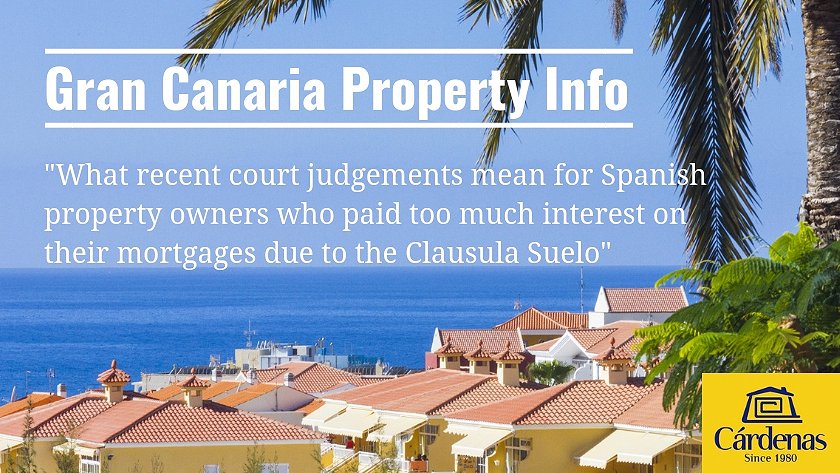
This article explains what recent European Court of Justice and Spanish Supreme Court judgements mean to consumers who paid too much in interest to their Spanish bank or mortgage provider due to Clausulas Suelo (Floor Clauses).
- Court judgements have established that you can reclaim excess interest payments stemming from Floor Clauses in your mortgage payments.
- How to go about claiming back your excess interest payments from your Spanish bank.
- What recent Supreme Court judgements about excess mortgage startup costs and whether it is worth claiming them back from your Spanish bank.
What have the courts said about Floor Clauses?
The Clausula Suelo (Floor Clause) is a clause included in many Spanish mortgage contracts that established the minimum interest paid by a borrower. The clause basically gave banks the right to charge a floor interest rate even if the EURIBOR rate (used by Spanish banks to calculate mortgage interest rates) dropped below it. On December 21, 2016, a historic ruling of the ECJ declared these clauses null and void and called for compensation of the total of the money overcharged: Its ruling was retroactive which was something that the Spanish Supreme Court had refused to apply. The Spanish Supreme Court had no choice but to change its doctrine to adapt to the ECJ ruling, which it did through a Judgment on February 24, 2017. However, there was enough wiggle room in the Spanish judgement for many banks to argue that they didn't have to pay court costs associated with recovering excess interest payments, even when the courts ruled in favour of a client. This interpretation was cut short by the Judgment of the Supreme Court on July 4, 2017, which stated that banks must pay court costs because they were the cause of the consumer having to go to court in the first place. In most subsequent court judgements, banks were found liable as the floor clauses are considered abusive and therefore null and void. Until the recent judgement by the ECJ, Spanish banks and credit institutions had alleged that private agreements signed with consumers meant that floor clause agreements were valid. However, correctly filed consumer Floor Clause claims are now guaranteed to be successful due to the numerous judgments and jurisprudence supporting consumer rights.Floor Clause agreements signed with customers don't protect banks
The last relevant Supreme Court judgement (from October 16, 2017) stated that floor clauses are null and void even if the consumer has signed an agreement with their bank. As it stands, this is the current state of consumer rights affecting Floor Clauses in Spain and the Canary Islands:- Consumers can claim back all the money that they overpaid due to a Floor Clause that falls short of the required levels of transparency (when the bank did not explain in detail all the characteristics of the product, especially its risks, including simulations of scenarios). They are entitled to a TOTAL refund and nullity of the Floor Clause (EUTG Judgment 21/12/16 and STS 24/02/2017 and others). Consumers can also make a legal claim against their bank even if they signed an agreement with their bank giving up their rights to do so. (STS 16/10/2017).
- Consumers can claim court costs if the Court considers your claim in its entirety (STS 4/07/2017).
What you need to go to court over a Floor Clause
Following the publication of Royal Decree-Law 1/2017, consumers can demand the return of Floor Clause monies owed by their bank using the forms provided by the bank itself, or by extrajudicial (out of court) claim prepared by the consumer or their lawyer. The bank has three months to return the overpaid interest and legal interest on the amount or to reject your claim. If your claim is rejected by your bank, you can then start a court case. To do so, all you need is your mortgage loan deed, the documents that prove that your bank imposed a Floor Clause and the papers to show that you tried to settle your claim amicably without success. To make a claim you do need to hire a Lawyer and a Procurator. It is highly advisable to use a lawyer for all phases of your claim, even in the early extrajudicial phase, as they know the most effective way to recover Floor Clause money, and how to review a potential settlement offer from your bank. Once your lawsuit is filed, resolution takes from 12 to 18 months unless there is an appeal which can stretch it out for more than three years.Deadline to claim against a bank Floor Clause
The Supreme Court has established a four-year deadline for claims according to the Civil Code. This deadline starts from the end date of the mortgage contract signed with your bank, NOT from the date it was signed or the date you realised that you had a case. This deadline was established in a February 19, 2018, ruling on mortgage swaps but applies to other products such as preferred, subordinated debt, Floor Clauses and convertible bonds. Furthermore, many legal sources maintain that the four year limit cannot, in any case, apply to Floor Clauses because they have been declared abusive and therefore "their nullity is radical, full of right and, therefore, this nullity, nor the action to exercise it in the courts, is not subject to any statute of limitations". Note that this Supreme Court rulings applies to consumer mortgages and to mortgages taken out by professional or corporate borrowers not specifically involved in financial business (the sentence came about after a claim by a real estate developer with a six million euro mortgage from Santander). Corporate and company mortgage holders should talk to a qualified specialist tax lawyer about their rights.Taxation of the return of Floor Clause overpayments
A court order established that money returned after a successful Floor Clause claim against a bank is taxed at the same rate as money returned directly by the bank after an extrajudicial process. As a general rule, taxpayers do not have to declare as income the amounts returned by the bank or any extra interest payments owed by the bank. This was established by Royal Decree-Law 1/2017, of 20 January, on urgent measures to protect consumers in terms of Floor Clauses. However, there are 2 exceptions:- Cases in which the interests were part of the deduction for investment in habitual residence or regional deductions.
- Cases in which the taxpayer included the amounts received as a deductible expense in previous years.
































































